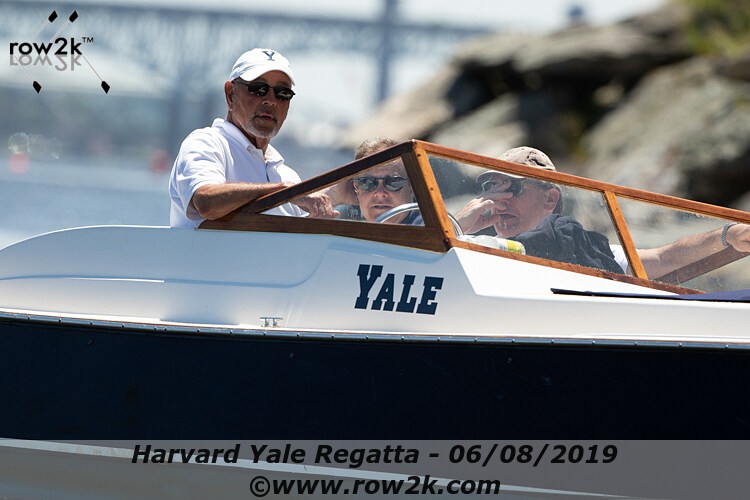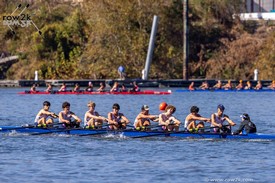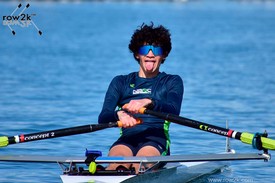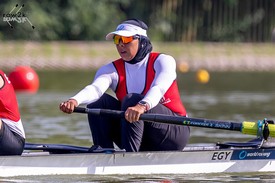Steve Gladstone – On Program Building & Teamwork
Oli Rosenbladt, row2k

As the COVID-19 crisis continues, row2k caught up with Yale head coach Steve Gladstone on the topic of program building, keeping programs going, and gaining speed.
You've made this point on numerous occasions over the years, whether it was at Brown, at Cal, or at Yale, that a top down leadership approach in a rowing team or any team doesn't really work. Can you expand on that idea?
Steve Gladstone: Any successful sustainable successful endeavor, has to be, in my experience, a partnership. Let me flesh that out a little bit. Clearly, coaches in general have a level of expertise in terms of, let's say, understanding the biomechanics of the rowing stroke, and also understanding the maturation of cyclical training. That being said, the piece that's most important is all that information – the information of the mechanics of the stroke, the training, cycling and so forth, all of that will have marginal value unless there's a sense that we're in this together.
I'll tell you how I've articulated it, both when I arrived at Cal, and here at Yale more recently. I said to the group that my arrival as the head coach was in and of itself not going to usher in automatic success on the racecourse. There's a level of expertise in the areas I've just referenced, but ultimately that expertise has no value unless you're individually driven and committed to the actualization of those concepts. So it ultimately it's a partnership. And the athletes are going to be the ones that ultimately determine to who makes the stand or if they make the stand. And that's just the way it is.
If you're a coach, you certainly could encourage, support, and tell the truth about what needs to be done to bring a situation forward. But ultimately the athletes will determine whether the whole process works. And once a significant portion of the squad understands that and understand that they have, if you will, the power to bring about the results in conjunction with the coach, there's real durability and strength that will take place on the racecourse to reflect their results.

Steve Gladstone: People observe each other when they're practicing. People observe each other's behavior. And people understand or witness the results of what you would call this partnership, they want to be part of it too. On the IRA varsity challenge cup, there's a latin statement engraved on the front of it. 'Spectemur Agendo,' which is "Let us be judged by our acts." So, people would observe each other. With this mindset, this is going to be a hell of a lot more productive on a daily basis than just a more captive, non-participatory mindset.
How easy or difficult is it to build that buy-in early in that process of being with a new team, when perhaps not all of the results are there yet? Is that more of a leap of faith for you or the athletes?
Steve Gladstone: Not everybody is suited for the sport, not everybody has what you would call a mindset that will put them in a strong position to compete. When I arrived at Yale, there clearly were a few people that had some ambition, who wanted something different than what they were experiencing. But, it really took time to attract people to the program that really loved rowing. And once you've attracted enough people that really love the process, and what they do on a daily basis, they're nurtured by it. It took a few years to get a critical mass of people that really wanted to have fun, wanted to enjoy themselves, and wanted to go fast, and were willing to work together to get that done.
How do you determine your priorities in the first couple of years in order to achieve this buy-in? What do you prioritize early on versus once you've established that framework?
Steve Gladstone: You do your work, you coach. You coach hard on a daily basis. Coaching implies the full spectrum of activities that a coach does. There's really nothing abstract: you have practice, and you encourage the oarsmen to bring full measure to the practice. It can be something as simple as, 'look, we're going to be on the water for an hour and 35 minutes, let's come off the water faster than we came on.'
You work to move the boat every stroke of every practice. The results, the morale, the energy is going to be a byproduct of bringing full measure to each practice, or I guess a more accurate way of saying it is, endeavoring to bring full measure to each practice. We're not around the conference table discussing integrity, or we're not at the conference table to discussing commitment. The boats and the oars in each individual practice is where your culture is built.
How are you able to observe that the athletes are beginning to get this notion of building the team from the inside with their own endeavors?
Steve Gladstone: You observe them on a daily basis, and you support them. Supporting them means not necessarily coddling them, but you support them in their quest. You support them in doing the right thing, and then you can begin to observe real energy in the group.
At Yale, during my third season, we began to show life signs. And good part of those life signs were byproduct of the freshman class that came in. Those freshmen really were having a good time, really enjoying themselves. I don't think there were many athletes in the group that were what you would call 'distinguished' oarsmen. But they were people who really liked what they're doing and it was palpable. And the tone of our boat bay changed with that group. We called them the "Phoenix class."
For any any top level athletic organization or a team, one of the most palpable measurements of the success of the program is racing results. Before those were as strong as they were the last three or four years…
Steve Gladstone: ...or five years or six years!
If I'm visualizing the process that you're describing, it's a bit of a tightrope walk. You say to your athletes, "if you practice hard, if you commit well, the success will come." But until it gets there, how do you continue to have people make progress?
Steve Gladstone: Success is not "we won the Eastern Sprints." Success is being better than you were the day before, faster than you were the day before. And somebody who is coaching, and doing a good job of coaching, lets people know that.
The other point is that, ultimately nobody is going to win all the races all the time. There are lots of programs that have success, that are maybe not measured by where they finish or medals. But the work was good, they brought it, and they got faster. I think that's ultimately the goal is to have people engage at that level.
There seems to be the assumption that you have all the guys with that integrity in the first boat, then the guys from the second boat not as much, and the third boat not as much, but that's bullshit. There are people with as much integrity in our fourth and fifth boat as there are people in our first boat, in terms of bringing it into practice, and the oarsmen know that. Some of the most respected people on our squad are not anywhere close to the top two boats. But people really respect what they're bringing on a daily basis. That, in and of itself, is the reward.
Do you ever find that that aspect of building a level of commitment and integrity throughout your program sometimes gets lost in the focus on the short term? Is it a harder sell in any way when people would rather sort of skip the intellectualisms and get right down to winning races?
Steve Gladstone: Athletes have a feeling of whether they are being respected, and whether their work is respected, and whether their endeavor is being respected. They know that, and it makes a difference in their practice. There was one guy three or four years ago who was pretty rough, and I remember him walking up the ramp after practice, and he said, "coach, I just love this." He just loved going out and competing every day.
And that's the message.
Steve Gladstone: That's not an intellectual concept.
In the last 20 or 30 years, there's been such a drive to measure everything. I think it's an important reminder that not everything can be measured in that way. Sports are not math and teams are not math problems.
Steve Gladstone: Here's a nuance to it. Unless you're saying that the goal is to bring full measure to every practice, and unless you do that on a consistent basis, you're not going to get the satisfaction that we just described. You won't.
It's not related to winning or losing. Unless you have a strong emotional commitment to bringing the best that you have on a consistent basis, you're not going to get the growth. You're not going to get the value of what these rowing programs are all about. It can't be careless. The nectar, if you will, is going to come from your commitment on a daily basis to make the boats faster.
In some ways, you could argue that it almost has to be that way because of the sheer difficulty of the sport.
Steve Gladstone: It does have to be that way. And I would suggest, in a collegiate program, in order for that program to have real value to the participants, for the participants in terms of life growth, that's the mindset that has to be there. And when you have that depth of commitment, you're going to have to deal with some tough stuff. You're going to have to deal with not getting what you want. You're going to have to deal with significant bumps in the road. And as a consequence of those bumps in the road, you're going to you're going to grow, and you're going to get value from doing what you do.
So don't misunderstand what I'm saying. The mindset you would want to have is that you want to be the best at what you do. If you're measuring that with what you did the day before, and the day before that, and that in and of itself is going to promote well-being and speed.

Now that the program has had some success, what does the exercise look like as you attract new people?
Steve Gladstone: I've said this a number of times, I think the two most important elements are that you have to find somebody who just absolutely loves rowing, they love the process, they love competing. To give the equivalent, in basketball they call them gym rats. Then on top of that these people have to demonstrate a capacity to work with other people. Those are the two characteristics. Then, when they arrive, we'll make it very clear to them that there is nothing automatic about what goes on here. In other words, they're not just going to walk into the program and collect shirts. It's an ongoing day by day quest.
[Yale Asst. Coach] Mike Gennaro had a great idea, he took all the trophies out of the trophy cabinet to start the year. He said, "it's a new year, none of you have won any of these. You won these last year, not this year." That's symbolic of the mindset.
I also want to be clear that none of this is smooth going. There are always moments when you sense that things just not working the way you want them to work. You're always staying alert to the sharp edge of the culture. So you don't row off into the sunset. Every year is a new story.
What are the little details that you look for that tell you that maybe you need to shift or you maybe you need to tweak the approach?
Steve Gladstone: It's always subtle. I think most coaches have a sense of what's going on at a particular point in time and they'll address either through the practice itself, or maybe a brief talk, will address the particular points that need to be underlined and refreshed. It's an ongoing dynamic. You have to know when to step back and give a little bit more room. Very often one of the very effective ways of working with the squad is to ask people's opinion.
On your coaching relationships with the athletes, you've got to be able to tell the truth about what's wanted and needed to bring things forward. You certainly don't need to be harsh. You want them to understand that you respect the fact that they're engaged here. And if you get that kind of relationship going with an individual, then you're can probably make some headway and there's going to be a pretty solid relationship.
I said to the coaches I work with, "if you've got a thought about some guy, like 'God I really wish we could get him to do X, Y and Z,' well tell him!" It's not a conversation with you or me. Take him aside and say, this is what I'm seeing, this is what you need to do. Whether it's how to train, or if the guy looks wasted all the time, or any number of things. In other words, you have to put it out there. And every time you put it out there, you're not necessarily going to get a result. But at least you've got the possibility of that person making an adjustment, or having people deal with what people call an "aha" moment. You've got to be able to talk them, even when you think you've coached them well. And sometimes your guys are going to get pissed off at you. That's the other thing you're going to be able to do, approach them and talk to them.

Widening the lens a little bit, in current "rowing memory," most people know Steve Gladstone from Yale, and then from Cal before that, and from Brown before that. Then probably most people's memory gets a little hazy; there was first stint at Cal, and your very successful time with the Harvard lightweights spanning the late 60s and early 70s. Would you say that that this approach to program building and team culture has always existed?
Steve Gladstone: Let me tell a funny story, though it's probably apocryphal. It was my first six months of coaching and there was an opening for a freshman heavyweight coach at Princeton. And for a variety of reasons, they didn't hire a freshman coach until December 1965. They offered it to Bill Stowe and he turned it down, and Tony Johnson, and he turned it down, so I was the last candidate. So I got there in December, and I was taking a bus from New York down to Princeton, and then I finally moved down there in January. And there was a little group of guys, it might have been 10 freshmen oarsmen, if that.
I didn't know anything about rowing at all. I'd rowed in high school, and I rowed at Syracuse. There wasn't all the material that's out there now. At that time we were all noodling on rowing and trying to figure out what would be our best way of approaching that biomechanically.
The season began and we opened against Rutgers and we won the race. Then the next race was against Navy and we won again, and we were thinking that we were really, really, really good. And then Ted Nash brought his group up from Penn. In those days, they were two mile races, or a mile and three-quarters. We lost by 17 seconds. And then the next weekend we went up to the basin and lost to Harvard by 17, 18 seconds. But we were undaunted, we just said, "we're going to go into the Sprints, we can get this done." We went to one to the Eastern Sprints and ended up in the petites, or at the bottom of Grand Final.
We got together back down in Princeton and started to get ready for the IRA, back then the IRA was just about everything. And we said, "OK, what are we going to do to get faster?" So there we were all huddled together, and then Bill Tytus says, "I know what we're going to do, we're going to all stop eating desserts!" Then somebody else says, "Yeah, and after every practice we're going to do 30 jumpies!" So that was the solution, that was the scientific approach that we took towards getting ready for the IRA.
So, long story short, we get to the IRA. The freshman race was two miles, and we led the race probably down to the last 20 strokes and ended up coming in second to Penn. So what's the story there? The story there is that the group had a ridiculous plan. They thought, and I thought, "this is going to do the trick."
We were a little band of brothers. In other words, I didn't tell Bill Tytus to stop eating desserts, and I didn't tell the team they had to do jumpies. That experience informed me for the rest of my coaching career, that there's nothing more important than faith and confidence in each other. Having a joint plan.
When we publish this, the nutshell is going to be that you can win the IRA by not eating dessert.
Steve Gladstone: The most important ingredient was that people had faith in one another that they were going to do everything they could to win the race. There's nothing more important than that. Now that being said, in reality in order to win major races, you're going to have to have people that not only have faith in one another and in the each other and their protocol, but you're going after people that have a certain level of ability as well. That combination is vital.
I'd say that most, coaches, myself included, are simply drawn to what's quantifiable: rigging measurements, erg scores and all that kind of stuff. But the most important piece without question is what I've alluded to, and that's hardly news. Coaches and people in leadership positions have said that for forever and a day. It's that that kind of bond that can produce results. That bond is built stroke by stroke, practice by practice, months and years. That's how it's built. There are no shortcuts. I'm always so amused by these people who would come try to tell universities, well we'll give you a bonding exercise, we'll take you away for a weekend somewhere, you'll climb ropes. All that's horseshit. No, bonds, faith, and confidence are built on a daily basis in practice, period. It's not about what you say, it's about what you do.
I think you're certainly right that that a group of people with faith in each other and good preparation can achieve any task they set themselves to, but with the desire to quantify everything these days, is that still the majority view? Look at the NFL draft, or Sabremetrics in baseball.
Steve Gladstone: And yet you brought it up, there's nothing that dispels the downfalls of quantification more than the NFL draft. The number one picks aren't playing four years later, and they spend millions of dollars on research.
Do any specific people or events in your career stand out as really having made a mark or giving you a marker where you said, 'this is really important, this is something I'm going to take with me and apply to what I'm doing.' What were your aha moments?
Steve Gladstone: I was very, very fortunate when I went up to Harvard to coach the lightweights. There was a group of oarsmen there that were the quintessence of people that really wanted to make the boat go fast. And I assisted them in that process, but it was very clear to me that that mindset they had was extraordinary, and they marked me.

In 1970,they won the Eastern Sprints by 10 seconds, then in 1971, they won the Eastern Sprints by 13 seconds. They were an exceptional group of people on all levels.
I recall an event, I think it was a Harvard recognition athletic banquet or something, and his crew was being inducted to the equivalent of Hall of Fame. And I remember vividly saying that I can recall that, for this group, it wasn't about beating the other crew. It was solely about how fast they could make their boat go. Because they were so much faster than everybody else, there wasn't going to be any satisfaction, unless they really approached each practice with a sense of how fast they could make the boat go. So that that group was really seminal.
Needless to say, there have been lots of other very fast crews over the years. But I think that group stands out, because I was young at the time, and I was very impressionable. That group really set a standard that I always either consciously or unconsciously held as the absolute. That group was my first experience with that idea, the way they approached their work, and so to this day, that is the ideal.
If you enjoy and rely on row2k, we need your help to be able to keep doing all this. Though row2k sometimes looks like a big, outside-funded operation, it mainly runs on enthusiasm and grit. Help us keep it coming, thank you! Learn more.
Comments | Log in to comment |
- Bont Rowing
- Calm Waters Rowing
- Concept 2
- Craftsbury Sculling
- The Crew Classic
- CrewLAB
- Croker
- Durham Boat Co.
- Empacher
- Faster Masters
- Filippi
- Fluidesign
- h2row.net
- HUDSON
- Live2Row Studios
- Nielsen-Kellerman
- Oak Ridge RA
- Peinert Boat Works
- Pocock Racing Shells
- Race1 USA
- RowKraft
- Rubini Jewelers
- Vespoli USA
- WinTech Racing
- Bont Rowing
- Calm Waters Rowing
- Concept 2
- Craftsbury Sculling
- The Crew Classic
- CrewLAB
- Croker
- Durham Boat Co.
- Empacher
- Faster Masters
- Filippi
- Fluidesign
- h2row.net
- HUDSON
- Live2Row Studios
- Nielsen-Kellerman
- Oak Ridge RA
- Peinert Boat Works
- Pocock Racing Shells
- Race1 USA
- RowKraft
- Rubini Jewelers
- Vespoli USA
- WinTech Racing


















04/15/2020 11:29:58 PM
04/15/2020 11:20:05 PM
04/15/2020 3:51:10 PM